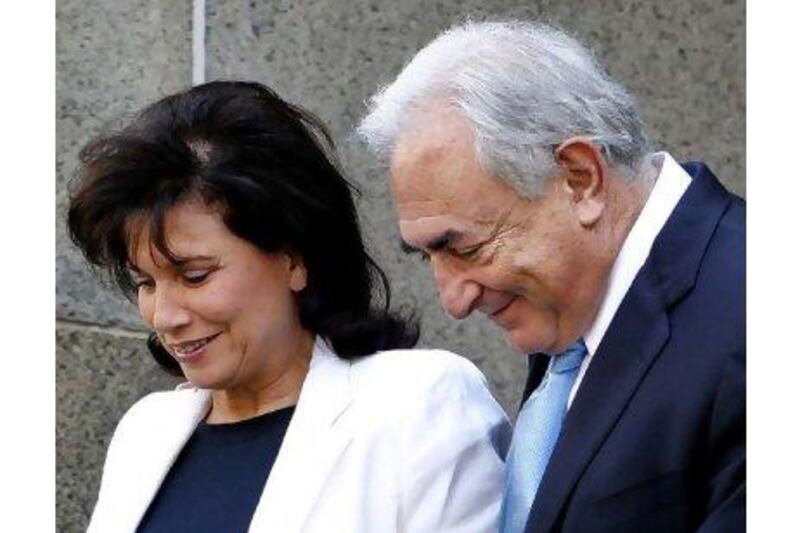MARSEILLE, FRANCE // Dominique Strauss-Kahn could make a remarkable comeback into French politics in the run-up to next year's presidential elections if the sexual assault case against him in New York collapses, supporters say.
Some socialist party allies are even speculating that DSK, as the former head of the International Monetary Fund is commonly known, can no longer be ruled out of the 2012 race for the Elysée.
Others feel the timing of the party's selection of a candidate, and of the US judicial process that has still to be concluded, may make this impractical.
But they refuse to rule out a key role for Mr Strauss-Kahn in the left's bid to regain presidential power for the first time since the late François Mitterrand stood down in 1995. A future ministerial role has also been suggested as socialists reflect on the extraordinary turn of events.
Mr Strauss-Kahn, who faces a series of charges including attempted rape after his encounter with a New York hotel chambermaid, had his strict bail conditions relaxed on Friday. Prosecutors now doubt the credibility of the alleged victim.
The judge, Justice Michael Obus, said the case was by no means closed but freed him from house arrest. He is now out on bail on his own recognisance, the court having ordered the return of his US$1m (Dh3.67m) bond and $5m insurance. He is at liberty to travel within the US but the authorities have retained his passport.
Should the case now disintegrate, as is widely expected by French commentators, some senior socialist party colleagues believe it is possible that Mr Strauss-Kahn could return to France as a presidential contender.
Michèle Sabban, a prominent party figure in the Paris region, said on French radio that the process of primaries to establish a candidate for 2012 should be halted if the charges are thrown out. Would-be candidates must declare themselves by July 13, although the final choice will not be made until October.
Jean-Marie Le Guen, a socialist MP and unwavering supporter of Mr Strauss-Kahn, said the former IMF managing director would be "an indispensable player in political life in the coming months".
He added: "If … American justice frees and rehabilitates him, and gives him back his honour and dignity, then, since Dominique Strauss-Kahn is a fighter, he will fight in our country."
Lionel Jospin, a former socialist prime minister, described events in New York as a "thunderbolt". The BBC quoted him as adding later: "If we hypothesise that Dominique is cleared of all suspicion and all charges, which I obviously hope will happen, then it will be first down to him to decide ... and then it will be down to the socialists to decide."
Opinion polls have made the socialists favourites to defeat the current president, Nicolas Sarkozy, and the far-right nationalist, Marine Le Pen, who represent obstacles to the French left seizing presidential power.
Before his arrest, Mr Strauss-Kahn was regarded as the strongest challenger from the left.
Despite the latest developments, many politicians and observers doubt his ability - or even will - to enter the race at this late stage. Unless the socialist primaries are paused, only 12 days remain for presidential hopefuls to declare themselves as contenders for the candidacy.
And questions remain as to whether too many allegations of inappropriate approaches to women have been made for him to be electable, even in a country that prides itself on a tolerant attitude towards the sex lives of public figures.
If the charges are dropped, there will still be doubt over the fitness for high office of a man whose reputation may have been tarnished by what has been said both about his encounter with the chambermaid and his past exploits.
But the news from New York will leave in France many feeling smug. Within hours of news of Mr Strauss-Kahn's arrest in May, the suspicion of conspiracy was on countless lips, both in private conversations and among some his supporters.
Even those who discounted suggestions he had been set up by enemies in the worlds of politics or international finance denounced the public humiliation of Mr Strauss-Kahn when he was paraded in handcuffs before television cameras. "He was thrown to the wolves," Mr Jospin said at the time.
Throughout, Mr Strauss-Kahn's protestations of innocence have been supported by his American-French wife, Anne Sinclair, a former presenter who is the heiress to an art fortune estimated by Forbes to be worth up to £125m.
Three prominent socialists already in the race for the Elysée have reacted with a mixture of relief and caution to the news, but have been less than enthusiastic about suggestions that the primaries process could be paused to give Mr Strauss-Kahn a chance to enter.
One, Ségolène Royal, Mr Sarkozy's defeated opponent in 2007, warned that final judgment was still pending and said entering an electoral fray was unlikely to among Mr Strauss-Kahn's priorities.
Meanwhile, in New York, the chambermaid's lawyer, Kenneth Thompson, insisted that the essential elements of the allegations remained unchanged.
"From day one, she has described a violent sexual assault that Dominique Strauss-Kahn committed against her," he said.
"She has described that assault many times and never once changed a single thing about that encounter."
* Additional reporting by Agence France-Presse







